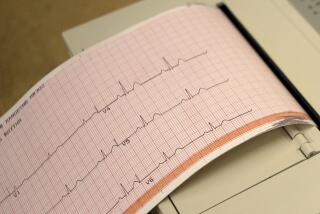Life-or-death data
- Share via
YOUR MEDICAL RECORDS can save your life, or they can almost kill you. So the prospect of making them more easily accessible is at once comforting and scary -- and a new effort to convert them into digital form will raise the stakes on both counts.
It’s not hard to understand why. Suppose you’re on vacation and become so ill you have to go to the hospital. Without your medical records, you could be given a drug that interacts badly with one you’re already taking. Now imagine the same scenario, only this time you have access to all your medical and insurance records electronically. The physician examines them and gives you an appropriate drug. You recover nicely.
Now imagine a third possibility: You have your medical records -- and they’re not completely accurate. You get a drug you’re allergic to, become even more sick and have to be admitted. Before long, lawyers become involved, subpoenaing everyone from your insurer to the datamanagement company that keeps your records.
Technology giveth, and technology taketh away. This country’s medical recordkeeping system is undoubtedly outdated and inefficient, and bringing it into the 21st century will be a huge improvement. But it will create new problems as it solves old ones, and some problems it simply will port over to the digital age.
Five major U.S. corporations -- Applied Materials, BP America, Intel, Pitney Bowes and Wal-Mart -- who provide health benefits to 2.5 million people announced plans last week to gather employees’ records from medical groups, hospitals, insurers and laboratories, then store them online. Employees can add or delete information to correct errors and fill in blanks. The main objective of the program, called Dossia and run by the nonprofit Omnimedix Institute, is to help them give complete, accurate information to their healthcare providers.
The most immediate benefit of this program, and others like it, may be to show how complex the problem is. For starters, the entire healthcare industry has to digitize its records and put them in a standard format that any doctor or hospital can use -- a gargantuan task. Then there has to be a way for individuals to correct errors in the records without rendering them unreliable. The error rate is particularly high for insurance records -- from 7% to 15%, according to various estimates.
Protecting health records from hackers and identity thieves is another challenge. Information brokers pay top dollar for health information -- reportedly $50 per record, compared to less than $2 for a Social Security number -- because they are so valuable to so many entities: drug companies, insurers, medical underwriters, health researchers and employers, to name a few.
There are scores of new initiatives such as Dossia, and all of them have weaknesses. Some appear to be good-faith efforts to give people more control over their own records and doctors access to better information. Others seem like thinly veiled marketing vehicles for drug makers and others in the healthcare industry.
To its credit, Dossia got two important things right. It won’t collect employees’ records without their permission. And it says it won’t supply those records to anyone but the employee (or authorized family member), sacrificing some efficiency for security. Eventually, perhaps, the program will show the way to have both. The most important contribution Dossia is likely to make, though, is that it will show how much more work needs to be done throughout the industry to solve the medical records morass in a way that works for doctors and patients alike.
More to Read
Inside the business of entertainment
The Wide Shot brings you news, analysis and insights on everything from streaming wars to production — and what it all means for the future.
You may occasionally receive promotional content from the Los Angeles Times.










